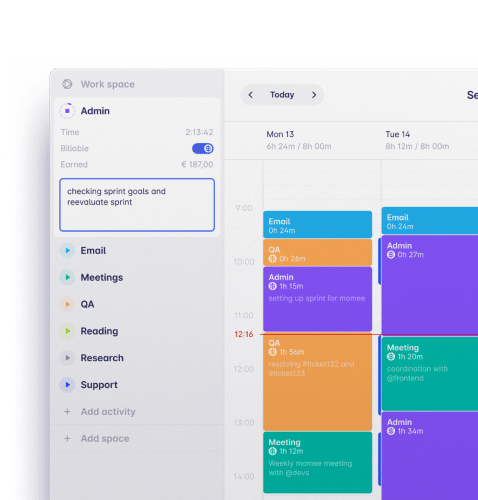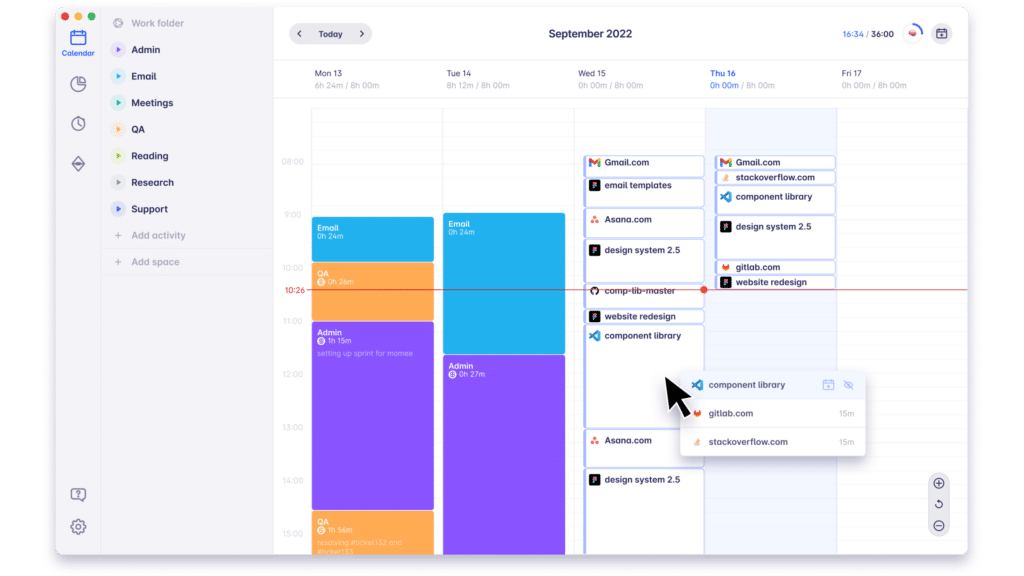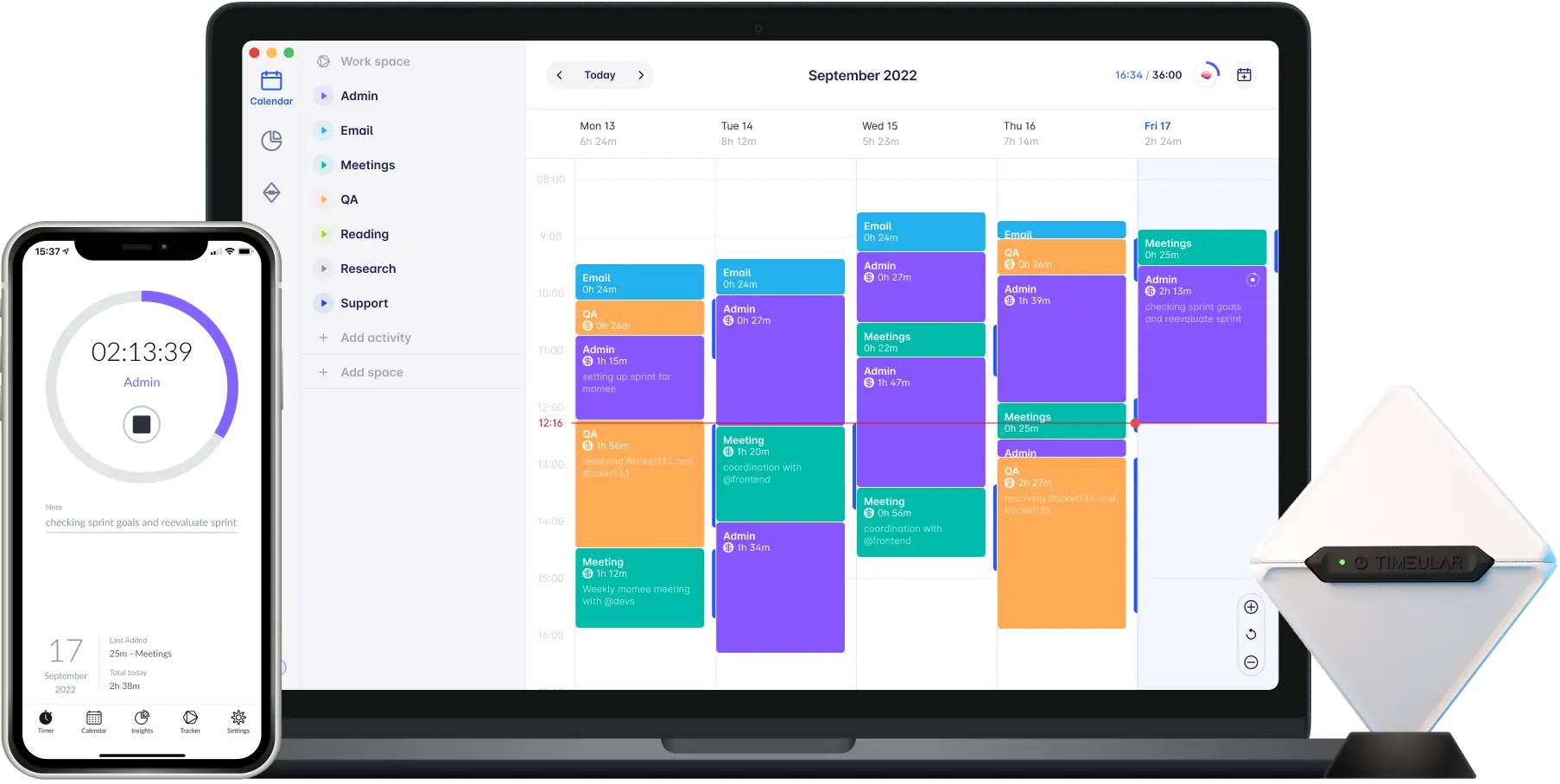Best Time Management Tips and Hacks
Mastering time management is paramount for business success. It not only boosts productivity, cuts costs, and increases revenue but also fosters a fulfilling work atmosphere with a healthy work-life balance.
Whether you’re an employee striving to meet deadlines or an entrepreneur juggling multiple tasks, understanding and implementing time management techniques can significantly impact your productivity and help you make the most of your time, while reducing your stress levels.

Looking for the most effortless and accurate time tracking tool?
No-one likes doing timesheets until trying Timeular. Even employees like tracking time with it.
In this article, you’ll discover the best time management tips, hacks, and techniques to help you master this essential skill and set yourself up for success.
What is time management?
Time management is the practice of using the time that you have available practically and effectively. It’s about making deliberate choices about allocating your time to maximize productivity and minimize wasted hours. As a disciplined approach to organizing and utilizing your time effectively, it helps to accomplish work goals, tasks, and projects on time.
In essence, time management is a soft skill that allows you to prioritize work, balance your personal and professional life, and ultimately achieve more in less time.
The best time management tips
1. Time audit
If you want to improve how you spend your time, first, it’s crucial to understand where your time goes.
This is where a time audit comes into play, and we can ensure you that this is one of the best time management tips you can adopt.
A time audit involves meticulously tracking your daily activities to identify patterns and areas where you can improve your time management. To do this effectively, consider using time-tracking tools such as Timeular.

Looking for the best tool to run time audits?
Find out where your time goes and make adjustments to use your time efficiently
2. Prioritizing work
Prioritization is the core of effective time management. It involves identifying your most urgent and important tasks and channeling your efforts towards them. This approach ensures that you tackle high-impact activities when your energy and concentration peak.
If you need help prioritizing your work, try using helpful frameworks like the ABCDE method, RICE framework, MosCoW, and Eisenhower Matrix.
By systematically classifying your tasks into tiers, you will allocate your time more effectively.
TIP: Read the article about the best task prioritization methods.
3. The Pomodoro technique
The Pomodoro technique, developed by Francesco Cirillo, is a time management method that involves working in short, focused bursts, typically 25 minutes, followed by a short break. This technique can boost your productivity by maintaining your mental freshness and motivation.
The Pomodoro Technique is based on the principle of timeboxing, which encourages intense focus within a fixed timeframe.
During each Pomodoro (a 25-minute work interval), you concentrate solely on your task. After completing a Pomodoro, take a short 5-minute break, and after every fourth Pomodoro, take a more extended break of 15-30 minutes.
This method capitalizes on the brain’s ability to maintain focus for a limited duration while preventing burnout.
TIP: To make your life easier, we suggest you adopt a timer app to avoid losing track of time.
4. Setting SMART goals
SMART goals are Specific, Measurable, Achievable, Relevant, and Time-bound. This goal-setting framework offers a clear and structured approach to defining and pursuing objectives.
SMART goals provide a blueprint for success. When you define SMART goals, you focus on what matters most and avoid time-wasting activities.
Read also: How to set realistic goals

Free eBook: How to plan your team’s time?
Get your free copy and learn how to combine expert time management tips with your team management methods
5. Delegating tasks
A top time management tip is to delegate!
Delegating tasks involves entrusting responsibilities to other team members or colleagues. Effective delegation lightens your workload and allows others to contribute their expertise.
Effective delegation is a leadership skill that requires careful consideration. When delegating, consider the following steps:
- Select the right person: Choose someone with the skills and knowledge to handle the task effectively.
- Clearly communicate the expected outcome: Clearly articulate your expectations, including the task’s objectives and timeline.
- Provide support: Offer guidance and resources to ensure the individual has all they need to deliver the expected outcome.
- Monitor progress: Maintain open communication and track progress without micromanaging.
- Acknowledge and reward: Recognize and reward the person’s efforts and accomplishments.
Delegation not only empowers your team but also frees up your time for more strategic tasks. If you want to master delegation, check our guide on how to delegate tasks effectively.
6. To-do lists
A commonly overlooked time management tip, crafting a to-do list remains a timeless and potent strategy. It entails jotting down your tasks and arranging them according to their significance and deadlines.
While to-do lists are simple, they are highly effective!
Reading recommendation: How to prioritize tasks
7. Reducing time wastage
A classic time management tip is identifying and eliminating time wasters in your workplace.
Time-wasting activities lead to procrastination habits, loss of focus, unproductive meetings, and, of course, decreased efficiency and productivity.
Reducing time wastage frees up valuable hours for tasks that contribute to your goals.
8. Automating repetitive tasks
Automation is a powerful time management hack. It involves using technology to handle routine, repetitive tasks, freeing you from manual, time-consuming work.
Automation can be applied to various aspects of your personal and professional life:
- Task automation tools: Employ task management apps that automate workflows, such as assigning tasks or sending notifications.
- Automated time tracking: If you do your timesheets manually, it takes hours! Save up time on automatic time tracking with Timeular.
- Email filters and rules: Set up filters to categorize and prioritize emails automatically.
- Social media scheduling: Use social media management tools to schedule posts in advance, saving time and ensuring consistent engagement.
- Financial automation: Set up automatic bill payments and savings transfers to manage your finances efficiently.
By automating repetitive tasks, you reduce the risk of errors and free up your mental bandwidth for more creative and strategic activities.
9. Setting boundaries
Establishing clear boundaries between work and personal life is vital for maintaining a balanced and fulfilling existence.
Boundary setting requires a conscious effort:
- Define work hours: Clearly establish your work hours and communicate them to colleagues, friends, and family.
- Create a dedicated workspace: Designate a specific area for work, even if you’re working from home. This helps mentally separate work and leisure.
- Turn off notifications: During your non-work hours, turn off work-related notifications on your devices to minimize distractions.
- Practice self-care: Dedicate time to self-care and relaxation. Prioritize activities that rejuvenate you, whether it’s exercise, reading, or spending time with loved ones.
Maintaining boundaries prevents burnout and enhances your overall well-being because it improves the way you manage your professional and personal time.
These are general time management tips that can be applied to employees, team leaders, project managers, and teams. Now, we will explore specific time management hacks for employees, remote workers, and employers.
Time management hacks for employees
1. Use time-tracking software
Leverage a time-tracking tool like Timeular to monitor your work hours accurately. This data-driven approach allows you to gain insights into how you allocate your time, identify patterns, and pinpoint areas where you can improve efficiency.
Besides tracking work hours, use time-tracking tools to categorize your activities. This categorization can reveal which tasks consume the most time, enabling you to optimize your workflow.
TIP: Read our post and get to know the list of the best time-tracking software for employees.
2. Start your day with a plan
Begin your workday by creating a detailed to-do list. This list should not just include tasks but should also outline your priorities. Having a clear plan helps you set the tone for the day and ensures you stay on track.
Implement this time management tip to begin every workday in a structured way.
3. Master email management
Emails can be a significant time drain if not managed efficiently. Instead of reacting to every notification, set specific times to check and respond to emails. This focused approach prevents constant interruptions and allows you to allocate dedicated time for email-related tasks.
Implement email filters and rules to automatically sort incoming emails into folders based on criteria such as sender, subject, or keywords. This keeps your inbox organized and ensures you don’t miss important messages.
4. Minimize the number of meetings
Meetings, while essential for collaboration, can sometimes become unproductive time sinks.
If you have control over your schedule, consider reducing the number and duration of meetings. Only attend those that are truly necessary and have a clear agenda.
Before accepting a meeting invitation, ask for an agenda. If it’s not provided or if your presence isn’t crucial, politely decline and suggest an alternative way to provide or receive the information, such as a concise email update or a shared document.
TIP: Use one of the following appointment scheduling apps to master your agenda.
5. Learn to say no
It’s essential not to overcommit. Politely decline additional tasks or projects if you believe your plate is already full. Recognize your limits and communicate them assertively.
When declining tasks, offer a clear explanation of your current workload and commitments. Suggest alternative solutions, such as delegating the task to a colleague or setting a realistic timeframe for its completion.
Time management tips for working from home
1. Create a dedicated workspace
This is one of the most important time management tips for remote workers because a dedicated workspace helps create a clear boundary between your personal and professional life. When you step into this space, you mentally transition into work mode.
Customize your workspace to maximize comfort and productivity. Invest in ergonomic furniture, adequate lighting, and noise-canceling headphones if needed.
Read also: Is working from home more productive?
2. Stick to a routine
Establish a daily routine that mimics your in-office schedule as closely as possible. This routine provides structure to your day, making it easier to manage your time effectively.
Your routine should include designated work hours, breaks, and a clear end-of-day routine. This structure ensures you maintain a healthy work-life balance.
3. Use technology wisely
Embrace productivity apps and software to streamline your work. Tools like project management software, team communication apps, and automation tools can enhance collaboration, reduce manual tasks, and improve overall efficiency.
Invest time in learning how to use these tools effectively. Many offer advanced features that, when mastered, can significantly impact your productivity.
Read also: Top Time tracking software for remote employees
4. Take breaks
An excessive workload is one of the top causes of stress at work. Usually, an excessive workload leads to skipping breaks, over-hours, and burnout.
So, avoid burnout by taking regular breaks to ensure you recharge throughout the day. These regular and short breaks can improve focus and concentration at the same time prevent mental fatigue.
During breaks, engage in activities that help you relax and recharge. This might include stretching exercises, a short walk, or a few minutes of meditation.
5. Talk to your flat mates
If you have a family member at home during work hours, it’s crucial to communicate your schedule and the importance of uninterrupted work time. Establish clear boundaries to minimize disruptions.
Create a family schedule that aligns with your work hours. Discuss the importance of quiet and uninterrupted periods, especially during crucial meetings or deadlines.
Time management tips for employers

Free eBook: How to plan your team’s time?
Get your free copy and learn how to combine expert time management tips with your team management methods
1. Foster a culture of efficiency
As an employer, encourage your team to prioritize work and find efficient ways to complete tasks.
Recognize and reward employees who excel at time management, as this can inspire others to follow suit.
Organize regular brainstorming sessions or workshops where employees can share time-saving tips and best practices. Encourage a collaborative approach to increase company efficiency.
2. Provide training
Offer time management training sessions to your employees. Equip them with the skills and tools they need to excel in their roles. Training can significantly improve overall productivity.
Tailor training programs to address specific time management challenges within your organization. Include practical exercises and real-world scenarios to reinforce learning.
Suggestion: Encourage your employees to enroll in a time management training course:
3. Set clear expectations
Communicate your expectations regarding deadlines and productivity clearly. Ensure that your team understands their responsibilities and the importance of meeting deadlines.
Use tools to define and track project management. Establish a culture where missed deadlines are reviewed constructively to identify areas for improvement.
4. Use time-tracking tools
Implement a team time-tracking tool not only for employees but also for project management. These tools can provide valuable insights into project timelines and resource allocation, helping you make informed decisions.
Analyze time-tracking data to identify bottlenecks or areas where resources are underutilized. This data-driven approach can lead to more efficient resource allocation.
5. Lead by example
As a leader, demonstrate good time management practices.
Your behavior sets the tone for your team. Show that you value efficiency and work-life balance by modeling these principles.
Share your time management tips and techniques with your team. When they see you implementing these strategies, they are more likely to adopt them themselves.
Conclusion
Mastering time management is a continuous journey that requires self-awareness, discipline, and, obviously, the right tools. By conducting a time audit, implementing these in-depth time management tips, and using tools such as Timeular, you can make substantial improvements in how you allocate your time.
Whether you’re an employee striving for better work-life balance or a business owner aiming to increase productivity, effective time management is the key to success!
Start implementing these time management tips and hacks today and watch your productivity grow while achieving a more balanced and fulfilling life.
Remember, good time management isn’t just about getting more done, it’s about living a richer life with time for what truly matters!
You might be interested in:






